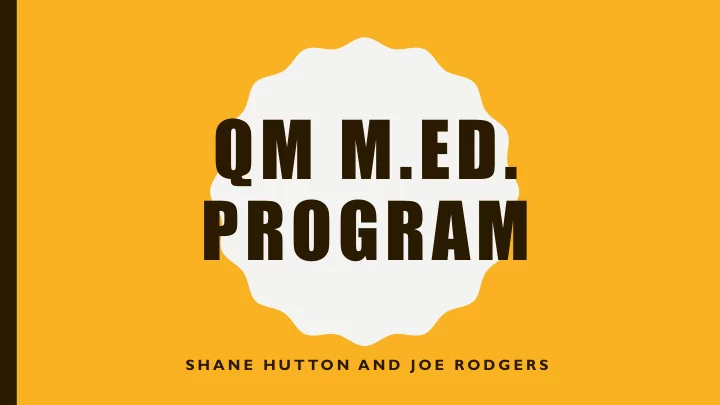

QM M.ED. PROGRAM S H A N E H U T TO N A N D J O E R O D G E R S
CURRICULUM • 33-hour program • Three required courses – Statistical Inference – Experimental Design – Statistical Consulting • One required hour of seminar activity • Two required hours of internship activity • Seven additional courses – One of which may be a content course outside the Quantitative Methods program – One of which may be a Quantitative Methods course outside of the Psychology and Human Development Department.
COURSES TYPICALLY OFFERED • PSY -GS 8867 Multivariate Analysis • PSY -GS 8870 Correlation and Regression • PSY -GS 8873 Structural Equation Modeling • PSY -GS 8850 Advanced SEM • PSY -GS 8876 Psychological Measurement • PSY -GS 8850 Exploratory and Graphical Data Analysis • PSY -GS 8850 Nonparametric Statistics • PSY -GS 8850 Survival Analysis • PSY -GS 8879 Factor Analysis • PSY -GS 8882 Multilevel Modeling • PSY -GS 8888 Latent growth Curve Modeling • PSY -GS 8885 Latent Class and Mixture Modeling • PSY -GS 8850 Applied Bayesian Analysis for Latent Variable Modeling • PSY -GS 8880 Introduction to Item Response Theory • PSY -GS 8881 Advanced Item Response Theory
INTERNSHIP • Internship placement is based on skills and interests • The internship takes place in an applied research setting, such as – Medical school research setting – State government agency – Testing company – School system • Requirements – An 8-10 page research summary of your internship activity – Presentation in Quantitative Forum
POSSIBLE SCHEDULE • 1 st semester • 3 rd semester – Statistical Inference – Statistical Consulting – Correlation and Regression – Elective – Psychological Measurement – Elective • 2 nd semester • 4 th semester – Experimental Design – Elective – Elective – Internship (2 hours) – Elective – Quantitative Forum (1 hour)
FACULTY • Sun-Joo Cho (item response theory; generalized latent variable modeling; test development and validation) • David Cole (structural equation modeling; mediation analysis; longitudinal methods; developmental psychopathology) • Shane Hutton (survival analysis; innovative teaching practices) • David Lubinski (measurement; assessment; individual differences; intellectual talent development) • Kristopher Preacher (structural equation modeling; multilevel modeling; mediation and moderation) • Joseph Rodgers (general multivariate methods; exploratory/graphical data analysis; multidimensional scaling and measurement; behavior genetics; adolescent development) • Sonya Sterba (latent variable models; longitudinal methods; mixture models; developmental psychopathology) • Andrew Tomarken (categorical data analysis; generalized linear models; longitudinal methods; clinical psychology) • Hao Wu (model evaluation; uncertainty quantification; robust and nonparametric methods; structural equation modeling)
CAREERS • Graduates of this program typically continue with doctoral studies in Quantitative Methods or find employment in research and data analysis settings such as: – Social/behavioral research laboratories – Public school systems – Medical school research – Testing companies – University research programs – Industrial research – Government research laboratories
RECENT GRADUATES • Recent graduates with an M.Ed. in Quantitative Methods have gone on the following positions, among others – Health Policy Analyst, Vanderbilt Medical School – Neuroimaging T echnician, Washington University Medical School – Senior Data Analyst, Capital One Financial Services – Statistical Research Analyst, T ennessee Department of Health – Statistician/SAS Programmer, BWX T echnologies – Graduate Programs • Biostatistics, Vanderbilt • Clinical Psychology, Vanderbilt • Clinical Psychology, UCSD • Organizational Behavior and Human Resources Management, Georgia State • Quantitative/Psychometric Methods, Minnesota • Quantitative Methods, Maryland
Recommend
More recommend